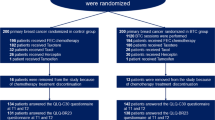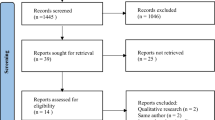Abstract
Purpose
This study aim was to evaluate efficacy of the combination with cosmetic and psychosocial education program on body image, sexual function, and emotional function among young-onset breast cancer (YBC).
Methods
An unblended, randomized, controlled trial design was conducted in patients newly diagnosed with stage I–III breast cancer from 2014 to 2015. The intervention group received a structured education program including appearance management and mind control for 4 weeks. The outcome of this study shows effect on body image and sexual functioning and a distress due to altered appearance and anxiety after the intervention and 6 months after intervention.
Results
Among 228 eligible patients, 109 (47.8%) agreed to participate in the present study and were randomized to intervention (n = 54) or control (n = 55) groups. After intervention, the intervention group reported significantly better body image compared to the control group (mean score of 75.0 vs. 59.3, respectively; P < 0.01). The intervention group also reported significantly lower levels of distress due to altered appearance and higher levels of sexual functioning compared to the control group after the intervention. The effects were maintained even 6 months after intervention.
Conclusion(s)
Body image intervention for YBC had effect on improving body image and sexual functioning and a reduction in distress due to altered appearance and anxiety.
Trial registration number and date of registration: The study was registered at the Clinical Research Information Service (no. KCT0001191, https://cris.nih.go.kr/cris) on 23 July 2014.




Similar content being viewed by others
Data and materials availability
The data that support the findings of this study are available on request from the corresponding author (JC).
Code availability
The codes that support the findings of this study are available on request from the corresponding author (JC).
References
Iyer R, Ring A (2017) Breast cancer survivorship: key issues and priorities of care. Br J Gen Pract 67:140–141
Kang SY, Kim YS, Kim Z, Kim HY, Kim HJ, Park S, Bae SY, Yoon KH, Lee SB, Lee SK, Jung K-W, Han J, Youn HJ (2020) Breast cancer statistics in Korea in 2017: data from a breast cancer registry. J Breast Cancer 23:115–128
Leong SP, Shen ZZ, Liu TJ, Agarwal G, Tajima T, Paik NS, Sandelin K, Derossis A, Cody H, Foulkes WD (2010) Is breast cancer the same disease in Asian and Western countries? World J Surg 34:2308–2324
Anders CK, Johnson R, Litton J, Phillips M, Bleyer A (2009) Breast cancer before age 40 years. Semin Oncol 36:237–249
Chen CL, Liao MN, Chen SC, Chan PL, Chen SC (2012) Body image and its predictors in breast cancer patients receiving surgery. Cancer Nurs 35:E10-16
Johnson RH, Chien FL, Bleyer A (2013) Incidence of breast cancer with distant involvement among women in the United States, 1976 to 2009. JAMA 309:800–805
Helms RL, O’Hea EL, Corso M (2008) Body image issues in women with breast cancer. Psychol Health Med 13:313–325
Cho J, Smith K, Choi EK, Kim IR, Chang YJ, Park HY, Guallar E, Shim YM (2013) Public attitudes toward cancer and cancer patients: a national survey in Korea. Psychooncology 22:605–613
Berterö C, Chamberlain Wilmoth M (2007) Breast cancer diagnosis and its treatment affecting the self: a meta-synthesis. Cancer Nurs 30:194–202 (quiz 203-194)
Kang D, Choi EK, Kim IR, Nam SJ, Lee JE, Im YH, Ahn JS, Park YH, Cho J (2018) Distress and body image due to altered appearance in posttreatment and active treatment of breast cancer patients and in general population controls. Palliat Support Care 16(2):137–145
Panjari M, Bell RJ, Davis SR (2011) Sexual function after breast cancer. J Sex Med 8:294–302
Rosenberg SM, Tamimi RM, Gelber S, Ruddy KJ, Kereakoglow S, Borges VF, Come SE, Schapira L, Winer EP, Partridge AH (2013) Body image in recently diagnosed young women with early breast cancer. Psychooncology 22:1849–1855
Manne SL, Girasek D, Ambrosino J (1994) An evaluation of the impact of a cosmetics class on breast cancer patients. J Psychosoc Oncol 12:83–99
Quintard B, Lakdja F (2008) Assessing the effect of beauty treatments on psychological distress, body image, and coping: a longitudinal study of patients undergoing surgical procedures for breast cancer. Psychooncology 17:1032–1038
Taggart LR, Ozolins L, Hardie H, Nyhof-Young J (2009) Look good feel better workshops: a “big lift” for women with cancer. J Cancer Educ 24:94–99
Esplen MJ, Wong J, Warner E, Toner B (2018) Restoring Body Image After Cancer (ReBIC): results of a randomized controlled trial. J Clin Oncol 36:749–756
Boquiren VM, Esplen MJ, Wong J, Toner B, Warner E (2013) Exploring the influence of gender-role socialization and objectified body consciousness on body image disturbance in breast cancer survivors. Psychooncology 22:2177–2185
Paterson CL, Lengacher CA, Donovan KA, Kip KE, Tofthagen CS (2016) Body image in younger breast cancer survivors: a systematic review. Cancer Nurs 39:E39-58
Sprangers MA, Groenvold M, Arraras JI, Franklin J, te Velde A, Muller M, Franzini L, Williams A, de Haes HC, Hopwood P, Cull A, Aaronson NK (1996) The European Organization for Research and Treatment of Cancer breast cancer-specific quality-of-life questionnaire module: first results from a three-country field study. J Clin Oncol 14:2756–2768
Yun YH, Bae SH, Kang IO, Shin KH, Lee R, Kwon SI, Park YS, Lee ES (2004) Cross-cultural application of the Korean version of the European Organization for Research and Treatment of Cancer (EORTC) Breast-Cancer-Specific Quality of Life Questionnaire (EORTC QLQ-BR23). Support Care Cancer 12:441–445
Khang D, Rim HD, Woo J (2013) The Korean version of the body image scale-reliability and validity in a sample of breast cancer patients. Psychiatry Investig 10:26–33
Fayers P, Aaronson NK, Bjordal K, Curran D, Groenvold M on behalf of the EORTC Quality of Life Study Group (2001) EORTC QLQ-C30 Scoring Manual (Third edition). Brussels: EORTC Quality of Life Group:86
Fayers PM (2001) Interpreting quality of life data: population-based reference data for the EORTC QLQ-C30. Eur J Cancer 37:1331–1334
Oh SM, Min KJ, Park DB (1999) A study on the standardization of the hospital anxiety and depression scale for Koreans: a comparison of normal, depressed and anxious groups. J Korean Neuropsychiatr Assoc 38:289–296
Zigmond AS, Snaith RP (1983) The hospital anxiety and depression scale. Acta Psychiatr Scand 67:361–370
Kang D, Kim IR, Choi EK, Yoon JH, Lee SK, Lee JE, Nam SJ, Han W, Noh DY, Cho J (2017) Who are happy survivors? Physical, psychosocial, and spiritual factors associated with happiness of breast cancer survivors during the transition from cancer patient to survivor. Psychooncology 26:1922–1928
Fayers PMAN, Bjorkal K (2001) The EORTC QLQ-C30 Scoring Manual, 3rd edn. European Organization for Research and Treatment of Cancer, Brussels
Park HY, Kim JH, Choi S, Kang E, Oh S, Kim JY, Kim SW (2015) Psychological effects of a cosmetic education programme in patients with breast cancer. Eur J Cancer Care (Engl) 24:493–502
Alleva JM, Sheeran P, Webb TL, Martijn C, Miles E (2015) A meta-analytic review of stand-alone interventions to improve body image. PLoS One 10:e0139177
Yılmaz M, Dissiz G, Usluoğlu AK, Iriz S, Demir F, Alacacioglu A (2019) Cancer-related stigma and depression in cancer patients in a middle-income country. Asia Pac J Oncol Nurs 7:95–102
Barkat S, Thomas-Danguin T, Bensafi M, Rouby C, Sicard G (2003) Odor and color of cosmetic products: correlations between subjective judgement and autonomous nervous system response. Int J Cosmet Sci 25:273–283
Ikeda M, Tamai N, Kanai H, Osaka M, Kondo K, Yamazaki T, Sanada H, Kamibeppu K (2020) Effects of the appearance care program for breast cancer patients receiving chemotherapy: a mixed method study. Cancer Rep (Hoboken) 3:e1242
Gilbert P, Irons C (2004) A pilot exploration of the use of compassionate images in a group of self-critical people. Memory 12:507–516
Neff KD (2009) The role of self-compassion in development: a healthier way to relate to oneself. Hum Dev 52:211–214
Sherman KA, Przezdziecki A, Alcorso J, Kilby CJ, Elder E, Boyages J, Koelmeyer L, Mackie H (2018) Reducing body image-related distress in women with breast cancer using a structured online writing exercise: results from the My Changed Body randomized controlled trial. J Clin Oncol 36:1930–1940
Siebenhüner AR, Mikolasek M, Witt CM, Barth J (2021) Improvements in health might contradict adherence to mobile health interventions: findings from a self-care cancer app study. J Altern Complement Med 27:115
Funding
JC was funded by AMOREPACIFIC CORPORATION and the Korea Breast Cancer Foundation.
Author information
Authors and Affiliations
Contributions
D Kang, JK Lee, N Kim, and J Cho designed the study. JK Lee, SK Lee, JE Lee, and SJ Nam collected the data. Kang D, JK Lee, and Cho J performed the data analysis. D Kang, JK Lee, N Kim, S Kim, and J Cho wrote the final report. All authors contributed to critical revision of the final report. J Cho is guarantors. All the authors had full access to all of the data and can take responsibility for the integrity of the data and the accuracy of the data analysis.
Corresponding author
Ethics declarations
Ethics approval
The study was approved by the Institutional Review Board of the Samsung Medical Center (SMC 2014–06-022).
Consent to participate
Informed consent was obtained from all individual participants involved in the study.
Consent for publication
N/A
Conflict of interest
The authors declare no competing interests.
Additional information
Publisher’s note
Springer Nature remains neutral with regard to jurisdictional claims in published maps and institutional affiliations.
Rights and permissions
About this article
Cite this article
Kang, D., Lee, J.K., Kim, N. et al. Effect of mind and body education on quality of life among young breast cancer patients: a randomized controlled trial. Support Care Cancer 30, 721–729 (2022). https://doi.org/10.1007/s00520-021-06459-4
Received:
Accepted:
Published:
Issue Date:
DOI: https://doi.org/10.1007/s00520-021-06459-4




